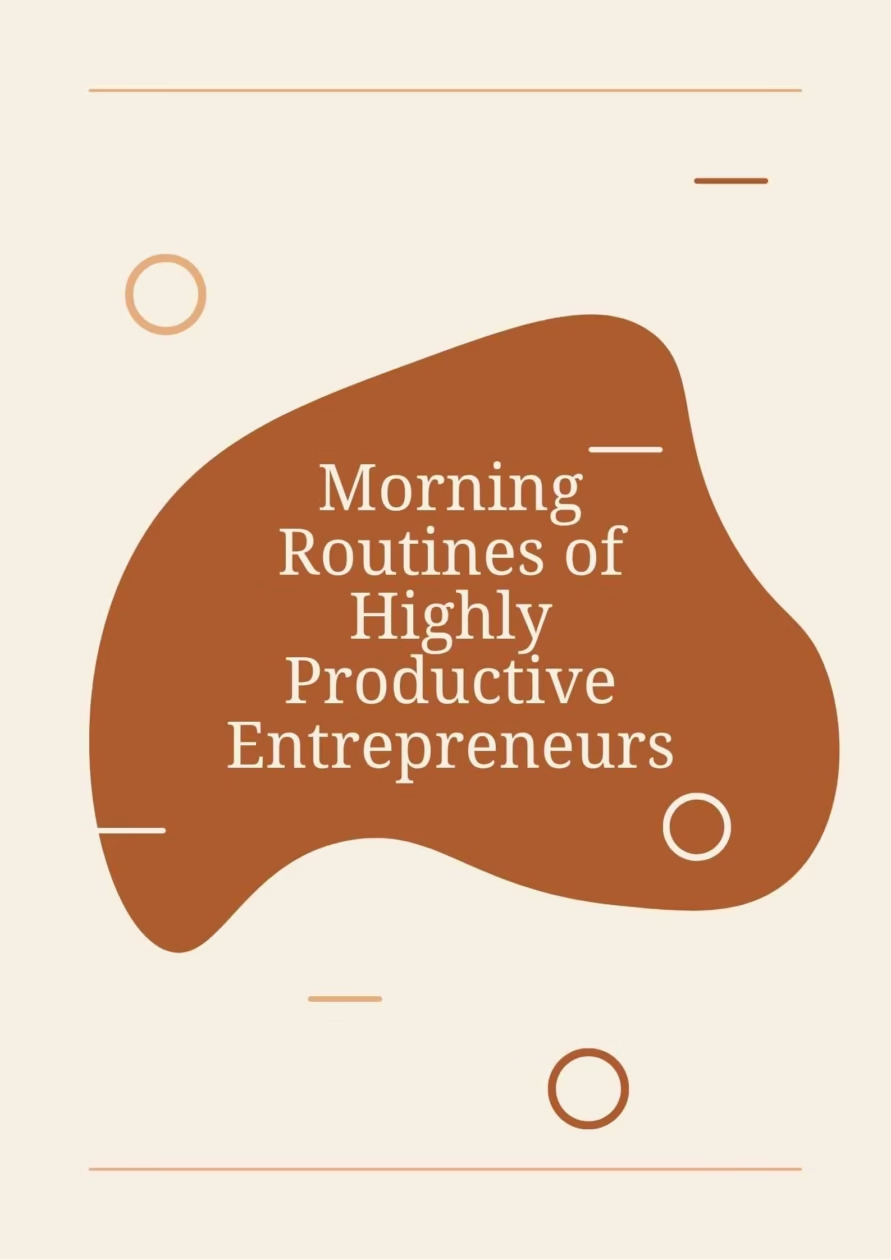While the world sleeps, the most successful entrepreneurs are already moving—not because they have to, but because they’ve discovered the secret that separates the extraordinary from the ordinary. Your morning routines productivity isn’t just about getting up early; it’s about engineering the first hours of your day to create unstoppable momentum that carries you through every challenge, decision, and opportunity that follows.
The statistics are staggering: 92% of highly successful people have a structured morning routines, and those who maintain consistent morning productivity routines report 40% higher levels of achievement and life satisfaction. But here’s what most people miss—it’s not just about waking up early. It’s about designing a system that primes your brain for peak performance, builds unshakeable discipline, and creates the mental clarity needed to tackle your most important work when your cognitive resources are at their strongest.
Why Your Morning Shapes Your Momentum
The science behind morning routines productivity is undeniable. During the first two hours after waking, your brain operates with maximum willpower and decision-making capacity. Neuroscientist Dr. Andrew Huberman’s research shows that cortisol levels naturally peak in the morning, providing the energy and focus needed for complex tasks. This biological advantage is why elite entrepreneurs structure their productive morning routines to tackle their most challenging work first.
When you master your morning, you master your entire day. The ripple effect extends far beyond those first few hours—it influences your energy levels, decision-making quality, stress management, and overall productivity throughout the day. Every successful entrepreneur understands this fundamental truth: the battle for your day is won or lost in the morning.
Inside the Morning Habits of 5 Elite Entrepreneurs
Tim Cook-CEO of Apple
Tim Cook approach to a beautiful day by waking up early like 4 to 5 AM in the morning and spend his first hour reading emails from customers and employees. He reflects on how customers love’s what he’s doing and reads their critics and opinions about what can be better. He emphasized it as a way to stay grounded. After few hours he later goes to the gym. “Before going to the office I go workout” Cook said. He spent an hour in the gym doing strength training. He also says “I do no work during that period of time”. He never checks his phone during workout.

Tim Cook’s approach to morning routine productivity is simple yet powerful-start grounded, stay focused, and protect your personal space before the chaos begins. By separating reflection, connection, and physical strength, he builds mental clarity and unstoppable momentum for the day ahead.
Elon Musk-CEO of Tesla, SpaceX, and X
Elon Musk’s approach to his morning is different from other entreperneurs. He typically wakes up around 7:00 AM and immediately dives into his most critical work problem-solving and decision-making. Musk avoids distractions like breakfast or lengthy rituals, often skipping meals in the morning to prioritize deep work. He’s a strong advocate of time-blocking, dedicating his day into 5-minute slots, and uses the early hours for high-leverage thinking. His mornings are all about optimizing brainpower before the day’s chaos kicks in.

Just like Tim Cook, Elon Musk protects his mornings for focused, high-impact work free from distractions. By prioritizing clarity and decision-making early on, he sets the tone for a day of relentless execution and innovation.
Sam Altman-CEO of OpenAI

Sam’s Altman early morning routines is simple. He emphasizes a radically simple approach to productivity: ditch the over-engineered tools and stick to handwritten lists. He advocates writing down your most important tasks every day on paper-a practice he says keeps the mind clear and focused. Rather than relying on digital systems that often distract more than they help, he recommends a hands-on, pen-and-paper method to frame each day’s goals.
Mark Zuckerberg-Chairman & CEO of Meta Platforms

Mark Zuckerberg has shared that he usually wakes up around 7:30 to 8 AM, often when his kids wake up. He said, “The first thing I do is look at my phone for Facebook, Messenger, and WhatsApp,” noting that it sometimes feels like “getting punched in the stomach.” Instead of drinking coffee or using stimulants, Zuckerberg explained he prefers to “rawdog reality” starting his mornings with intense physical training, such as MMA and Brazilian jiu-jitsu, for about 1-2 hours. He believes this helps sharpen his mind and body for the day ahead without relying on caffeine or other substances.
Richard Brandson-Founder of the Virgin Group

The founder of virgin group, wakes up early usually waking up at around 5:00 AM. He believes in the power of early rising to get a head start and make the most of the day. His morning routine typically begins with exercise, such as tennis, cycling, or kitesurfing, which he says boosts his energy and productivity. After working out, he enjoys a healthy breakfast with his family, followed by time to read the news, check emails, and review plans for the day. Branson emphasizes starting the morning with purpose and positivity, which helps him maintain his adventurous spirit and drive for innovation.
The Science Behind Morning Routines Productivity
The key lies in understanding how morning routine productivity impacts your brain’s executive function-the cognitive processes responsible for decision-making, focus, and goal-directed behavior.
During the first two hours after waking, your brain produces optimal levels of:
- Dopamine for motivation and reward-seeking
- Norepinephrine for attention and alertness
- Acetylcholine for learning and memory consolidation
This neurochemical cocktail creates what researchers call the “morning advantage” a window of enhanced cognitive performance that elite entrepreneurs leverage through their productive morning routines.
In short, science shows that a well-structured morning routine isn’t just a personal preference-it’s a biologically optimized strategy to kickstart a productive, focused, and successful day.
The Productivity Multiplier Effect
Morning routine productivity creates what researchers call the “compound effect” small, consistent actions that generate exponential results over time. When you invest 60-90 minutes in a structured productive morning routine, you’re not just improving those specific hours; you’re programming your entire day for success.
The entrepreneurs profiled in this article didn’t achieve their breakthrough success overnight. They built their empires one morning at a time, using disciplined morning productivity routines to create the mental clarity, physical energy, and strategic focus needed to tackle their biggest challenges and opportunities.
How to Plan Your Morning Routines
A well structured morning can set you do things fast and productive. The key to planning an effective morning routine lies in identifying your personal priorities and working backward from your must-leave time. Begin by listing activities that make you feel prepared and positive, whether that’s meditation, exercise, journaling, or simply enjoying your coffee without rushing.
Remember that consistency matters more than perfection-aim for a routine you can realistically maintain even on busy days. The most successful morning routines are those that align with your values and lifestyle, creating a sustainable foundation that supports your goals while leaving room for flexibility when life inevitably throws curveballs your way.
Here are some key steps that I have developed for myself and made it my morning daily routine:
Wake Up Early (6:00 AM – 6:30 AM)
Start the day early to have quiet, distraction-free time for deep thinking and writing.
10-Minute Mindfulness or Meditation
Clear the mind and set a focused intention for the day to avoid mental clutter.
Hydrate + Light Stretching
Drink a glass of water and do 5–10 minutes of stretches to awaken the body.
Read for 20 Minutes
Read a book, article, or newsletter related to writing, creativity, or industry trends to stay inspired and informed.
Brain Dump or Journaling
Spend 5–10 minutes writing freely—thoughts, ideas, or goals—to declutter the mind and spark creativity.
Review Content Plan / To-Do List
Check your content calendar or task list for the day and prioritize your top 3 writing goals.
Light Breakfast + Coffee or Tea
Fuel your brain with a balanced meal and enjoy a warm beverage to get into writing mode.
Write First Draft or Content Block (Deep Work Session)
Spend 60–90 minutes on your most important writing task before checking emails or social media.
Quick Review & Edit (Optional)
Do a light pass on what you’ve written, or leave it for later depending on your energy flow.
Check Notifications / Email
Delay email and social media until after your focused writing block to avoid distraction.







Howdy this is somewhat of off topic but I was wondering if blogs use WYSIWYG editors or if you have to manually code with HTML. I’m starting a blog soon but have no coding know-how so I wanted to get guidance from someone with experience. Any help would be greatly appreciated!
Hi…I use wordpress cms
I like this website very much, Its a rattling nice position to read and get information. “A fair exterior is a silent recommendation.” by Publilius Syrus.
Thank You for reading
I envy your piece of work, regards for all the interesting articles.